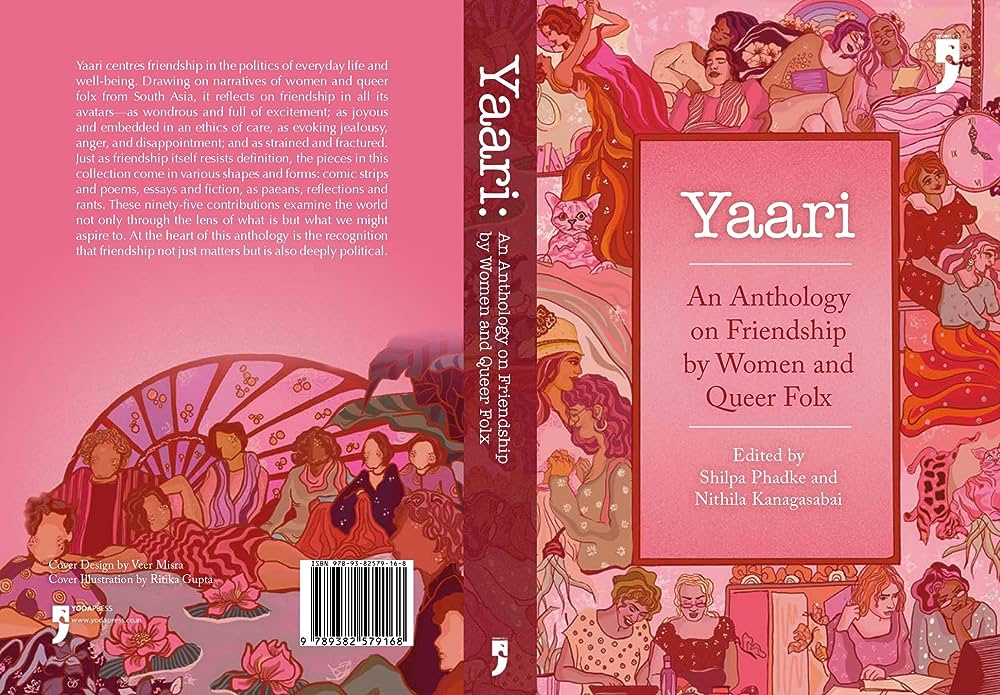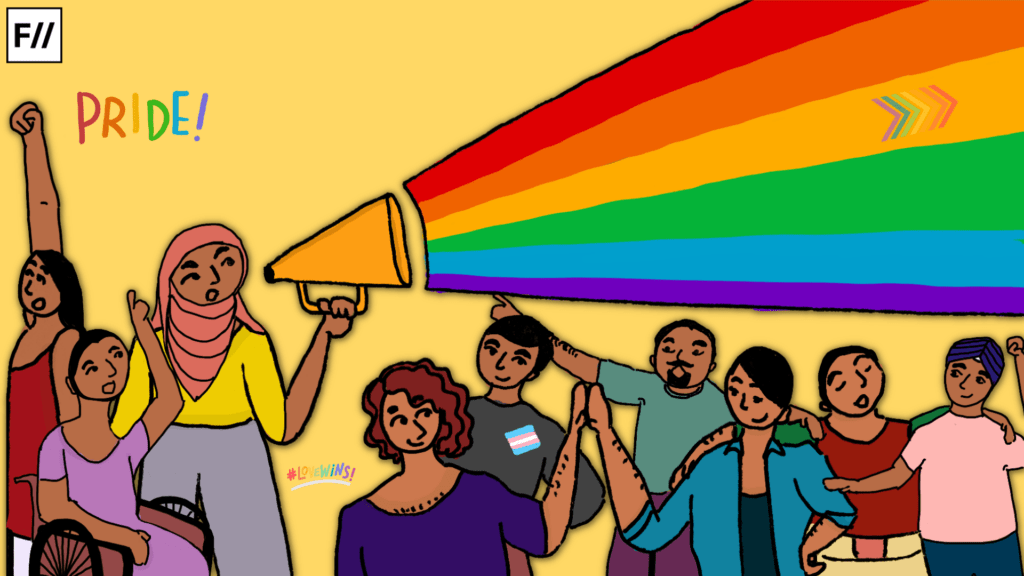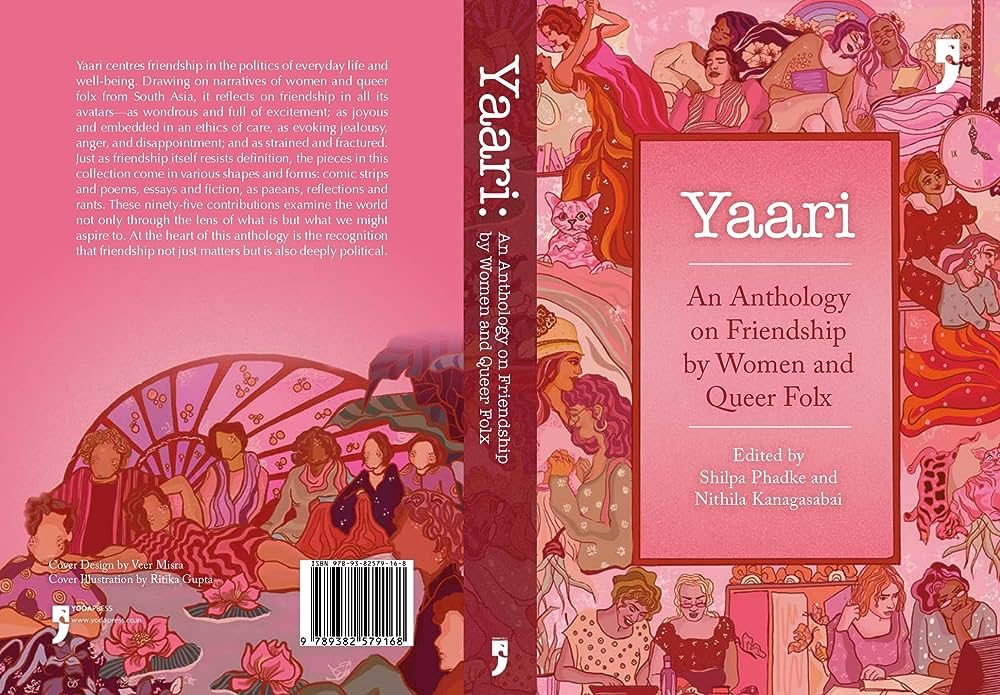Friendship is a theme that has been a lesser explored focus of media (most focused is romance) from “buddy” movies targeted at male audiences to sisterhood movies to road trips. It still remains a prominent theme about how we connect with other people through shared experiences or differences that are worlds apart. In the Indian context, the concept of yaari or jigri yaar also has been widely celebrated, be it through movies like Rang De Basanti or through the everyday experiences of friendship in itself. There have been some different and fresh perspectives on friendship as well, for instance, Rhaina Cohen’s piece on prioritising friendship over marriage as the centre of life.
Yoda Press’ Yaari: An Anthology on Friendship by Women and Queer Folx (edited by Shilpa Phadke and Nithila Kanagasabai) comes as a heartwarming celebration of friendship in all its avatars, drawing from the narratives of women and queer folx from South Asia. Through a wide range of contributions spread through 9 sections, it ponders over its complexity, brings in new perspectives from experiences, asks a lot of questions about boundaries, and at the end, places it as something that adds meaning to life.

Reviewing Yaari: An Anthology on Friendship by Women and Queer Folx is quite perplexing as it is an amalgamation of almost every possible way of having a community through friends. There is something for everyone here, and for me as a reader as well, every contributor offers unique insights. And the anthology has 95 contributions, some of which are supplemented by marvellous art in various forms. This also includes the cover design by Veer Misra and cover illustration by Ritika Gupta, which are in warm colours depicting the small instances of hope and rest in friendship. It centres friendships in the politics of everyday life and well-being through comic strips, poems, rants, personal essays, and reflections.
The anthology states in the beginning that friendship is political. And sometimes, it is an emotional connection that goes deeper than love. There is the idea of choice yet there are some restraints placed by the society, particularly some contexts of intolerance and divisiveness. The anthology builds on all this, shifting the focus towards women and queer folx, particularly from South Asia.
The anthology, Yaari: An Anthology on Friendship by Women and Queer Folx, states in the beginning that friendship is political. And sometimes, it is an emotional connection that goes deeper than love. There is the idea of choice yet there are some restraints placed by the society, particularly some contexts of intolerance and divisiveness. The anthology builds on all this, shifting the focus towards women and queer folx, particularly from South Asia. Even though it admits that India in the end became overrepresented, the anthology is still a unique and delightful read.
What definitely works in Yaari: An Anthology on Friendship by Women and Queer Folx is the division into nine sections – Love Friendship Intimacy, Girls Women M(others), Resistance Solidarity Solace, Grief Longing Loss, Pandemic Protest Resilience, Distance Disappointment Rage, Virtual realities Technologies Connections, Pedagogy Care Communities, and Cities Spaces Conversations; pieces that don’t run very lengthy, and a sense of relatability is presented through diverse forms of contributions.
Section I Love Friendship Intimacy dives right into politics through an essay that looks at friendship through South Asian Feminism. The profoundly political and personal piece by Subha Wijesiriwardena (a feminist activist and researcher from Sri Lanka) dives into a journey of feminist activism and how that taught Subha to make friends. Placing friendship as the most intimate and deep form of love, the essay is also an ode to the feminist movement in South Asia.
The contributions that follow ask us to make room for friendship in the heart of human experience by privileging them, a fun and adorable comic strip, and a young writer’s reflections on embracing momentary friendship in chance encounters. Shilpa Phadke’s essay on friendship with men discusses the possibility of romance within friendship and also the privileging of heterosexual romance between the two gender binaries as the highest form of connection.
The contributions that follow ask us to make room for friendship in the heart of human experience by privileging them, a fun and adorable comic strip, and a young writer’s reflections on embracing momentary friendship in chance encounters. Shilpa Phadke’s essay on friendship with men discusses the possibility of romance within friendship and also the privileging of heterosexual romance between the two gender binaries as the highest form of connection.
Other contributions explore what Bollywood didn’t teach about friendship, an illustration on how friends will save us, singlehood and friendship, among a host of other themes. And this is all just a peek into the section as every section has its own charm. At the same time, while neatly divided into nine sections, every contribution spills over into a multitude of themes and isn’t really restricted to the three words of their respective section. Unfortunately, reviews are constrained by word limits, disallowing to mention each contributor and how fabulous yet simple their contribution(s) are.
Section II in Yaari: An Anthology on Friendship by Women and Queer Folx focuses on Girls, Women M(others), finding its roots in sisterhood and also the question of identity and belonging as girls, women, m(others), and students. Some contributions briefly explore the pandemic, sending voice notes instead of texts on WhatsApp, and a stellar essay on Booksmart’s brand of feminist friendship. Section III (Resistance Solidarity Solace), Section IV Grief Longing Loss, Section V (Pandemic Protest Resilience), Section VI (Distance Disappointment Rage), and Section VII (Virtual Realities Technologies Connections) weave together a host of complex emotions around friendship during the pandemic and the politics of friendship in today’s political climate.

Grief has consumed our lives since the onset of the Covid-19 pandemic. It showed up and we had no systems to deal with the loss of life as everything was uprooted. Out of these dark times, these contributions take some complex emotions like rage and disappointment. The experiences resonate, they validate our own lived realities and also tell us what it feels like for women and queer folx in a largely male-dominated heteronormative world. Solidarities, trauma, bonding with cousins, and being not just a Muslim friend are the contributions centred in the themes of resistance, solidarity, and solace.
The next set in Yaari: An Anthology on Friendship by Women and Queer Folx is about grief, longing and loss – I find this section in a way the most cathartic part of the anthology as some of us are still stuck in those moments of leaving or being left in the absence of any possibility of closure. There is also exploration of intimacies and expressing them digitally towards friends, and also within families, which are formed in “come close, move away” forms. One particular stand out is an essay on being a mom-friend, as it ties into friends actually taking on some of the more caring roles similar to those of parents. Section V also has some standout contributions, including the ones on crip friendships, a pandemic love story (illustrated as well) featuring a catto, all women’s book club, and loss and resilience.
Section VI is the one that asks the most difficult questions – Raju Baehara talks about being a bad queer friend, there are questions on acknowledging privilege, on #metoo and friendship, Ritika Gupta draws up on the mystery of friendship and autism, and how to cope with losing friends to fascism. As a researcher who has worked on feminist ethics of care, the penultimate section, Section VIII on Pedagogy Care Communities is what drew my attention instantly.
Through insights into various spaces, it’s a crucial section divulging into how spaces can be restricting for women and queer folx and how they navigate these complexities.
From recognising ways of caring for the self, and finding care in academia, to discussing the complex ethics of care being a caregiver or a care receiver, it’s a reflective section on caring in communities. The anthology closes with its Section IX on Cities Spaces Conversations, which brings in cities, acts like loitering, and the role cities as a space play in shaping our friendships. Through insights into various spaces, it’s a crucial section divulging into how spaces can be restricting for women and queer folx and how they navigate these complexities.

Yaari: An Anthology on Friendship by Women and Queer Folx is a heartwarming read that traverses the joy of friendship, the complexity of ethics of care within these bonds, and also the changing nature of friendship embedded in the politics of everyday life. It is a much-recommended read for everyone who values friendship in some or the other way, as there is one that can relate to it and laugh, cry or just think about what these questions and reconfigurations around the idea of friendship mean for them. And what value they hold for them in their own unique social contexts.




